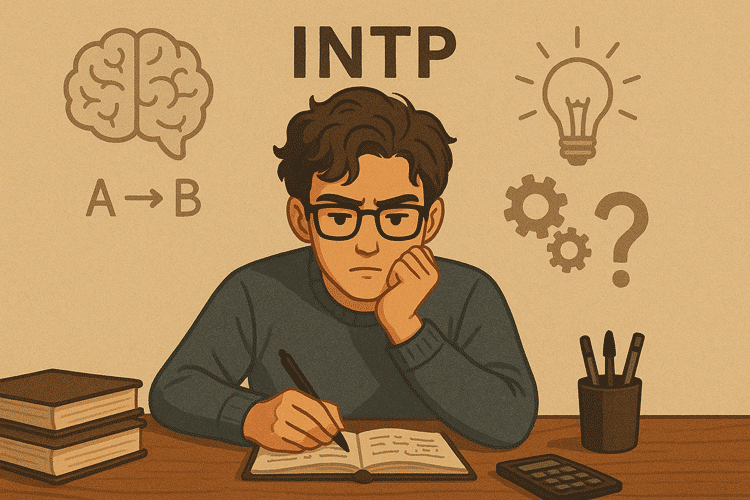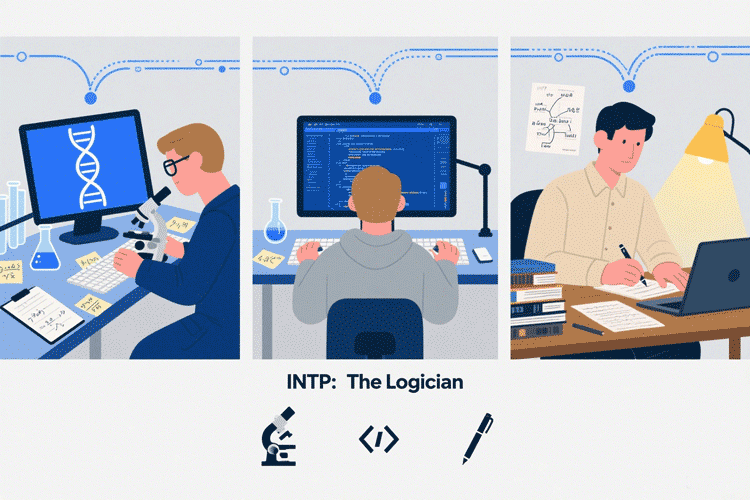meta_title: “Decoding INTP Personality: Traits, Careers, and Famous INTPs” meta_description: “Explore the INTP personality type in depth, including meaning, characteristics, famous INTPs, career paths, and examples from fiction. Discover why INTPs are called ‘The Logicians’.”

Decoding INTP Personality: The World of the Logician
INTP personality is a type known for logical reasoning, independent exploration, and creative thinking. They build bridges between abstract ideas and the real world, striving to uncover the truth behind everything.
1. INTP Meaning: From MBTI to the Birth of the Logician
1.1 MBTI Theory Background
The MBTI (Myers-Briggs Type Indicator) was developed in the mid-20th century by Katharine Briggs and Isabel Briggs Myers, based on Carl Jung’s psychological type theory.
INTP personality is one of the rarest types, representing only 3%–5% of the global population, and is even less common among women. This personality type is often called the “Logician” or “Thinker”, symbolizing the combination of deep thought and abstract reasoning.
1.2 The Four Letters of INTP
I (Introversion): Gains energy from solitude and focuses on the inner world. N (Intuition): Prefers abstract concepts and big-picture trends over concrete details. T (Thinking): Prioritizes logic and objective facts in decision-making. P (Perceiving): Maintains flexibility and openness, enjoying exploration rather than sticking to rigid plans.
2. INTP Characteristics: Core Traits and Cognitive Functions
2.1 Cognitive Function Stack
The personality structure of an INTP personality is shaped by four core cognitive functions:
Dominant: Introverted Thinking (Ti) – Deep analysis, building internal logical models, and seeking precision and consistency. Auxiliary: Extraverted Intuition (Ne) – Skilled at making connections and exploring possibilities from multiple perspectives. Tertiary: Introverted Sensing (Si) – Uses past experiences to test hypotheses and ensure practical feasibility. Inferior: Extraverted Feeling (Fe) – Less naturally attuned to others’ emotions, but capable of warmth and cooperation when needed.
2.2 Behavioral and Thinking Patterns
Logic-oriented: Every idea must stand up to rational scrutiny. Curiosity-driven: Always asking “why” and “what if.” Highly independent: Prefers self-directed research without excessive interference. Easily distracted: Interests are broad, and they may explore many fields at once.
3. Emotional and Interpersonal Style of INTP Personality
Emotional expression: INTP personalities tend to be reserved in emotional communication, often showing care through problem-solving rather than overt affection. Interpersonal interaction: They enjoy deep conversations with like-minded individuals and have little interest in small talk. Conflict resolution: They lean toward rationalizing conflicts and finding logical solutions.
4. INTP Characters: Representations in Film and Literature
Many fictional characters embody INTP characteristics:
Sherlock Holmes – Analytical, logical, and highly observant; a classic INTP personality. Neo (The Matrix) – Challenges reality and seeks the ultimate truth. Luna Lovegood (Harry Potter) – Eccentric thinking and independent spirit. Bruce Banner (The Avengers) – A scientific genius with inner conflicts. Gandalf (The Lord of the Rings) – Analyzes from a macro perspective and guides the team forward.
5. INTP Celebrities: Real-Life Thinkers and Innovators
Well-known INTP personalities in real life include:
Albert Einstein – A symbol of scientific revolution. Bill Gates – A master of logic in technology and business. Marie Curie – A pioneer in persistent scientific exploration. Charles Darwin – The founder of the theory of evolution. Alan Turing – A father of computer science. Søren Kierkegaard – A philosophical thinker. Isaac Newton – A giant of physics and mathematics. René Descartes – A foundational figure in philosophy and science.
6. INTP Jobs and INTP Careers: In-Depth Career Paths
INTP personality types thrive in careers that allow freedom to explore and apply logical thinking.
6.1 Science and Research
Physicist, chemist, or biological researcher Theoretical mathematician Artificial intelligence research specialist
6.2 Technology and Engineering
Software engineer / data scientist Systems architect Cybersecurity analyst
6.3 Creative and Writing
Science fiction author Game designer Creative consultant
6.4 Consulting and Analysis
Strategic consultant Business data analyst Investment analyst
6.5 Education and Academia
University professor Subject matter lecturer Academic researcher
7. INTP Personality Across Life Stages
Teen years: Broad interests but may lack a clear sense of direction. Young adulthood: Focuses on specialized fields, needs to balance thinking with action. Midlife: Achieves depth in career and research. Mature years: Leans toward sharing knowledge and mentoring others.
8. Challenges and Strategies for INTP Personality
Common challenges:
Procrastination and overanalysis Difficulty expressing emotions Low tolerance for repetitive tasks
Solutions:
Set small, actionable goals Practice emotional communication Find new perspectives in monotonous tasks
9. Conclusion
INTP personality is rare but exceptionally creative. On their journey to seek truth and explore the unknown, they continuously push the boundaries of thought. Whether in science, art, or technology, they have the potential to become forces that change the world.
The INTP personality is one of the 16 types in the Myers-Briggs Type Indicator (MBTI). INTP stands for Introverted, Intuitive, Thinking, Perceiving. People with this personality type are often logical, analytical, and deeply curious about how things work. They are known as "The Thinkers" or "The Architects" for their ability to develop complex ideas and theoretical models.
The best careers for an INTP personality often involve problem-solving, innovation, and independent thinking. Popular INTP jobs and careers include software engineer, data scientist, researcher, architect, writer, and game designer. INTPs thrive in environments where creativity and analytical skills are valued, and where they have the freedom to explore unconventional solutions.
Many INTP celebrities and historical figures have made significant contributions to science, philosophy, and creative fields. Examples include Albert Einstein, Marie Curie, Bill Gates, Abraham Lincoln, and fictional characters like Neo from The Matrix. These individuals embody the INTP characteristics of deep thinking, curiosity, and innovative problem-solving.



